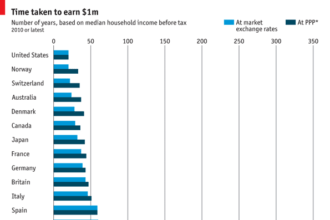Tyler Cowen posted 10 common mistakes of market-oriented economists the other day, paired with 14 common mistakes of left-wing economists. That prompted Ezra Klein to propose his own list of mistakes and others are chiming in. I think it’s too bad that economists are classified as right and left. After all, economics is a science and reality is reality. Why should political preferences interfere with the scientific quest for truth? Milton Friedman once said there are only two kinds of economics: good economics and bad economics. I not only agree, I think only “good economics” qualifies as “economics.” But I’ll yield to convention for the remainder of this post. On health care, Tyler says right-of-center economists go wrong in two ways:
- I’m all for Health Savings Accounts, Tyler writes, but unless done on a Singaporean scale, and with lots of forced savings, they’re not a health care plan to significantly benefit most Americans.
- There is less of a coherent health care plan, coming from this side [the right] than one might like to think. There is already considerable health care cost control embedded in the Affordable Care Act (ACA), most of all for Medicare, and this is not admitted with sufficient frequency.
On the first item, I have four rejoinders:
(a) We are not going to solve the triple problems of cost, quality, and access unless patients control the marginal dollars and are required to choose between health care and other uses of money for every elective decision.
(b) We do not really need to force people to manage their own money in a Health Savings Account (although I admit that most of these accounts are currently a form of paternalism). It is in the interest of third-party payers to create them.
(c) Major efforts are already underway to give patients control over health care dollars, and they are successful — they’re just not called “Health Savings Accounts.”
(d) There are serious health reform proposals on the right — every bit as comprehensive as ObamaCare and much better.
Let’s take (c) first. Due mainly to pilot programs funded by the (not-very-right-wing) Robert Wood Johnson Foundation and administered by the (not-very-right-wing) Medicaid bureaucracy, thousands of homebound, disabled patients are managing their own budgets. They can hire and fire the people who provide them with services and they can use the money they don’t spend in other ways. Satisfaction rates in this program (called “Cash and Counseling” in most places) exceed 95% — something unheard of in any other health care program in the world. A Commonwealth Fund study describes similar programs underway in Europe and they are increasingly popular. In addition to the homebound disabled, cash payments are viewed as a less expensive alternative to providing long term care services to a variety of patients. As I argued in Health Affairs some time ago, we have barely scratched the surface on patient empowerment for the chronically ill. Numerous studies have shown that patients managing their own care get results as good or better than under conventional care. To get the incentives right, patients also need to manage the money that pays for that care. In most cases, we don’t need forced savings, however. It’s in the self-interest of employers and insurers to make the deposits to the accounts on behalf of the patient. The South African health insurance market has made major strides in this direction. True, in Singapore deposits to Medisave accounts are mandatory. But as far as I can tell, South Africa has made even greater progress without mandates. Another overlooked phenomenon is the Flexible Spending Account (FSA). These are not liked by economists because they are use-it-or-lose-it accounts that encourage wasteful spending at year-end. Even so, as The Wall Street Journal discovered, FSA owners are careful shoppers with their own money. And if the accounts could roll over and grow tax-free, we could have 33 million health savers in addition to the 23 million who have HSAs and Health Reimbursement Arrangements (HRAs). Finally, the Coburn-Ryan-McCain approach to health reform is every bit as comprehensive as ObamaCare and it is more progressive. It is partly based on a what Tyler would probably call “right-of-center” proposal that Mark Pauly and I described in Health Affairs and it would be even better if the politicians had followed our advice more completely. On Tyler’s second point, there is not just “considerable” cost control in Medicare under the new health reform law, it is huge. And that’s the whole problem. It’s too huge to take seriously. On paper, ObamaCare cut Medicare’s unfunded liability in half the minute Barack Obama signed the health reform bill. (A reduction of more than $53 trillion — looking indefinitely into the future!) Going forward, Medicare will grow no faster than the economy as a whole. This means that Medicare spending will grow no faster than the payroll and income taxes that fund it. (No more increasing Medicare deficits!) What makes this fiscal good fortune possible? According to Medicare’s Office of the Actuary, Medicare payments to doctors and hospitals will fall further and further behind payments made by the private sector and other payers. In fact, by the end of this decade, Medicare payments will fall below Medicaid’s. (Elderly patients will be less desirable than welfare mothers to the doctors who treat them!) If we actually did this, what would it mean? According to Harvard health economist Joe Newhouse, senior citizens would be forced to get medical care from community health centers and safety-net hospitals — just as many Medicaid patients do today. Those who can afford it will pay out-of-pocket for concierge services. Is this real reform? Is it politically survivable reform? On the second question, note that Congress has been unwilling to carry out cuts to doctors’ fees called for by previous congressional Medicare “reforms” — hence the “doc fix.” Is there any reason to think that some future Congress will have more courage and more resolve than this one? And even if we go forward as planned, and the cuts are made, remember: the savings don’t go to pay down the national debt. Every penny of savings has been committed to a new entitlement. It’s called ObamaCare.








